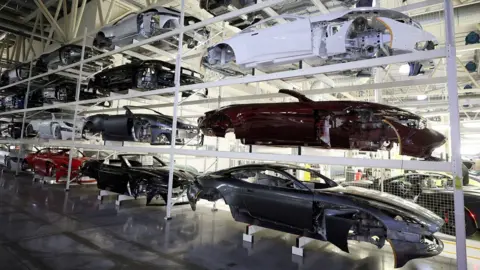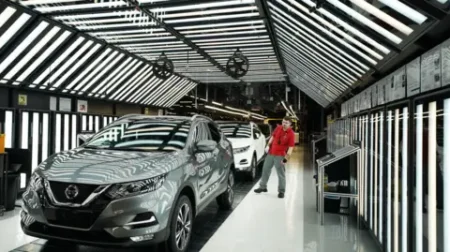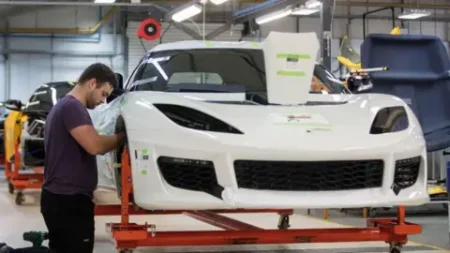In May 2025, the UK car production hit an alarming low, registering its smallest output in 76 years. A report from the Society of Motor Manufacturers and Traders (SMMT) revealed that the production plummeted nearly 33% compared to the previous year, amounting to only 49,810 units. This significant drop can be primarily attributed to the imposition of tariffs by the United States, affecting the export dynamics of the British automotive industry.
As the SMMT pointed out, this adverse trend marks the lowest production figures since 1949, excluding the significant downturn experienced during the pandemic lockdowns in 2020. The imposition of 25% tariffs on cars and car parts by the Trump administration in early March severely curtailed exports to the US market, which halved within a short span. Major UK car manufacturers, including Jaguar Land Rover, were compelled to halt their shipments to the US in April shortly after the tariffs took effect. Aston Martin also reported a decline in exports to the US market. These developments led to a substantial reduction in the US share of UK car exports, which fell from nearly 20% to just over 10% in May.
Besides the tariffs, the shift toward electric vehicles has also placed additional strain on production levels, as factories continue to adapt to new manufacturing processes. The SMMT highlighted that these transitions are essential for the competitiveness of UK automotive producers amidst a rapidly changing global market.
Despite the foreboding news regarding production levels, there is a glimmer of hope on the horizon. Recently, the US and the UK negotiated an agreement to reduce the tariffs on a specified number of British cars from 25% to 10%. This trade deal is set to be implemented before the close of June, which the SMMT indicated could alleviate some production constraints in the near term. The organization expressed cautious optimism that these favorable developments might revitalize the sector, fostering a rebound in production capabilities.
Mike Hawes, the chief executive of SMMT, acknowledged that 2025 has presented substantial challenges for the UK automotive sector; however, he remains hopeful about its recovery. He emphasized the importance of trade arrangements with pivotal markets such as the US, India, and the European Union, alongside government initiatives aimed at bolstering the automotive industry. These strategic partnerships and policies could play a critical role in navigating the current hurdles and paving the way for sustained growth in the future.
In closing, the crisis facing the UK car production industry serves as a reminder of the intricate connections between geopolitics and commerce. The fallout from the Trump administration’s tariffs reveals the vulnerability of domestic manufacturers in a globalized economy. As the sector strives to overcome temporary setbacks, the upcoming trade agreement provides a potential avenue for resurgence, reflecting the resilience and adaptability of the UK automotive landscape in the face of adversity.











